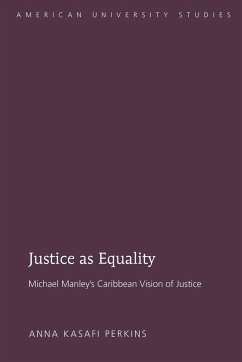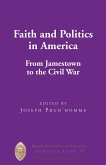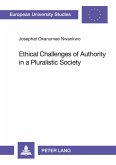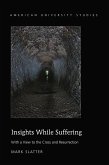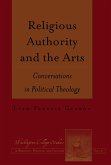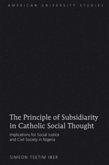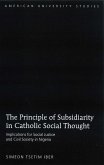Justice as Equality makes a unique contribution to the philosophical and intellectual tradition of the English-speaking Caribbean by exploring the theory of justice underpinning the life, work, and writings of former Prime Minister of Jamaica and renowned Third World Statesman the late Michael Manley (1924-1997). Manley's singular Caribbean vision of justice was forged in a post-colonial context that he described as being too radically disfigured by inequalities to be improved by «mere tinkering». This book posits that equality has become unfashionable in social analysis and contemporary politics, in part due to the increased significance of values such as identity, diversity, and difference, in tandem with a misunderstanding of the concept of equality. It argues for a reclaiming of a multi-faceted and complex way of understanding equality in light of Manley's thought. Through an engagement with the norms of justice developed within the Catholic social teaching tradition, this book examines, clarifies, and deepens Manley's Caribbean account of «justice as equality». Manley's theory is a deeply relational theory one of justice and equality that roots fundamental human equality in the relationship to divine transcendence. It calls for the dismantling of all relationships of oppression and domination that result when the fundamental equality of all human beings is disregarded. It takes account of the multiple dimensions of the human person, and calls a society 'just' when it allows for the flourishing of every member, specifically through full participation in the life of the society.
«Anna Kasafi Perkins shows why equality should be the central norm guiding development policy. Drawing on the thought of Jamaica's Michael Manley and the resources of Catholic social ethics, she presents a strong challenge to all policies that seek to address reality of poverty in the developing world. A valuable contribution to the ethics of development.» (David Hollenbach, S.J., University Chair in Human Rights and International Justice, Boston College)
«'Justice as Equality' has quite brilliantly rescued this 'highly contested' concept of equality from the rhetoric of political sloganeering, while escaping the pedantic theory of religious dogma. Dr. Perkins has analyzed Michael Manley's concept of equality and juxtaposed it with the social consciousness of Catholicism to delineate a notion of political morality that would provide an excellent blue print for contemporary political praxis. An enlightening read not only for academicians, but for all who may wish to reorient the Jamaica/Caribbean body politic to a kind of moral ideal from which 'equality as justice' can be assured.» (Danny Roberts, CD, Former Chairman, Michael Manley Foundation, and Head, Hugh Lawson Shearer Trade Union Education Institute, Jamaica)
«Anna Kasafi Perkins has produced a comprehensive and compelling analysis of Michael Manley's views on justice and equality. This book provides new insights into the genesis and evolution of Manley's thinking on these issues and points to the influence of Catholic social doctrine in the formation of his ideas. The study should be of interest to the serious scholar of Caribbean political thought as well as the public at large.» (Denis Benn, Michael Manley Professor of Public Affairs and Public Policy, University of the West Indies, Mona, Jamaica)
«'Justice as Equality' has quite brilliantly rescued this 'highly contested' concept of equality from the rhetoric of political sloganeering, while escaping the pedantic theory of religious dogma. Dr. Perkins has analyzed Michael Manley's concept of equality and juxtaposed it with the social consciousness of Catholicism to delineate a notion of political morality that would provide an excellent blue print for contemporary political praxis. An enlightening read not only for academicians, but for all who may wish to reorient the Jamaica/Caribbean body politic to a kind of moral ideal from which 'equality as justice' can be assured.» (Danny Roberts, CD, Former Chairman, Michael Manley Foundation, and Head, Hugh Lawson Shearer Trade Union Education Institute, Jamaica)
«Anna Kasafi Perkins has produced a comprehensive and compelling analysis of Michael Manley's views on justice and equality. This book provides new insights into the genesis and evolution of Manley's thinking on these issues and points to the influence of Catholic social doctrine in the formation of his ideas. The study should be of interest to the serious scholar of Caribbean political thought as well as the public at large.» (Denis Benn, Michael Manley Professor of Public Affairs and Public Policy, University of the West Indies, Mona, Jamaica)

